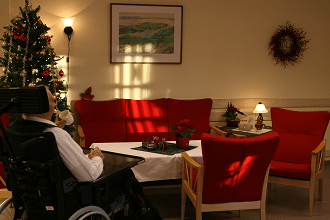Stop Separating Elderly Couples, Says Judge
Stop Separating Elderly Couples, Says Judge
Sir James Munby, Britain’s leading family judge, has expressed his outrage over the practice of putting older couples into different care homes.
Although such instances were rare, Sir James said no one should ever be taken from their home and separated from other family members against their wishes. He said it was “simply inhumanity” that couples who have spent many decades in one another’s company can be separated in their twilight years.
In a speech to the Association of Directors of Adult Social Services conference (Adass), the 68-year-old judge, who is due to retire next year, said: “We do know that people die of a broken heart. I have read of cases where one person died and then the other dies a couple of days later. How long do people last if they are uprooted? A very short time.”
Sir James, who is the president of the Family Division of the High Court, said it was “absolutely shocking and a profound indictment of our society” that elderly and vulnerable couples who wanted to live together were sometimes refused shared accommodation and told, “you’re going to go here, you’re going to go there.”
He said health professionals should give a higher priority to the happiness of those in care and focus less on procedure or safety rules, adding that forcing frail people to leave their homes was not always the best decision if it would substantially impact their happiness
He called on social workers to apply a “common decency test” and do more to keep couples together.
CONTACT OUR WILLS, TRUSTS AND PROBATE EXPERTS TODAY.
Protection under the Human Rights Act
Caroline Abrahams, charity Director at Age UK, said couples who wanted to stay together should be allowed to do so, except in rare situations.
“When councils arrange care for an older person they have a legal duty to ensure it meets their needs . . . They have to take into account their psychological needs, as well as how any arrangements will respect their right to family life under the Human Rights Act,” she said.
Margaret Willcox, president of Adass, said social workers worked hard to make sure the rights of older people were safeguarded and to keep elderly people together if that was what they wanted.
“There are always complex issues to consider, such as how to make this work where relationships are abusive, or when one person in the couple has needs the other can’t cope with . . . social care frequently involves helping people during some of the most difficult times of their lives and the importance of social workers and social care needs to be more widely recognised,” she said.
Broken heart syndrome is not a myth
A study published two years ago in the journal JAMA Internal Medicine found that, while it was a rare occurrence, the number of people who had a heart attack or a stroke in the month after a loved-one died was double that of a matched control group who were not grieving.
One of the authors of the report, Dr Sunil Shah of St George’s at the University of London, said:
“We often use the term a ‘broken heart’ to signify the pain of losing a loved one and our study shows that bereavement can have a direct effect on the health of the heart.”
This ‘broken heart syndrome.’ which is more formally referred to as stress cardiomyopathy or takotsubo cardiomyopathy, is a “temporary condition where your heart muscle becomes suddenly weakened or stunned. The left ventricle, one of the heart’s chambers, changes shape,” according to the British Heart Foundation.
Expert advice on wills, trusts and probate matters
For advice on creating a will, setting up a trust, lasting power of attorney, Court of Protection matters, probate and inheritance tax and estate planning, please contact our expert solicitors on 01494 790002. Alternatively, please email us at estatemanagement@ibblaw.co.uk or complete our online form.

